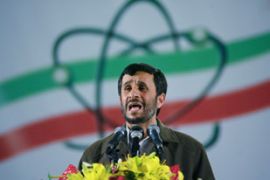Iran ‘seeks change to nuclear deal’
Iran formally responds to IAEA pact on its atomic programme.

“We welcome fuel exchange, nuclear co-operation, building of power plants and reactors and we are ready to co-operate,” he said in a live broadcast on state television.
Ahmadinejad added that Iran would not retreat “one iota” on its nuclear rights, and that the provision of nuclear fuel to a Tehran reactor would test the “honesty” of global powers.
‘Buying time’
Nazanine Moshiri, Al Jazeera’s correspondent in Tehran, said Iran’s proposed changes to the deal were “extremely important” for the country.
“What Ahmadinejad said in his speech is that this is an opportunity to evaluate the ‘honesty’ of world powers and that is an issue here.
| in depth | |||||||||||||||||||||
|
“What this does is it buys time – the Iranians will still be able to enrich uranium at their Natanz plant and they will still be able to replace whatever they have sent abroad,” she said.
The pact, which would allow Iran to receive nuclear fuel for a research reactor, was designed to help allay fears among Western nations that believe Iran intends to build nuclear weapons – a charge Tehran denies.
Baqer Moin, an author and journalist who specialises in Iran, told Al Jazeera that Ahmadinejad’s government may see a “positive side to the deal if it leads to reduce the international sanctions”.
“I think that if the sanctions are lifted, it will help the Iranian economy because they really can’t afford to have a major foreign policy problem while at the same time an internal problem of unemployment,” he said.
The news comes as a team from the IAEA returned to base in Vienna, Austria, after inspecting a controversial nuclear plant near the Iranian town of Qom.
Last month’s disclosure over the Qom plant added to international concern over Iran’s atomic programme.
Iran has already been enriching uranium – the most controversial aspect of its nuclear project – for several years at another plant in the central city of Natanz, in defiance of three sets of UN sanctions.
Enriched uranium produces fuel for civilian reactors, but in a highly extended form can also make the fissile core of an atomic bomb.
